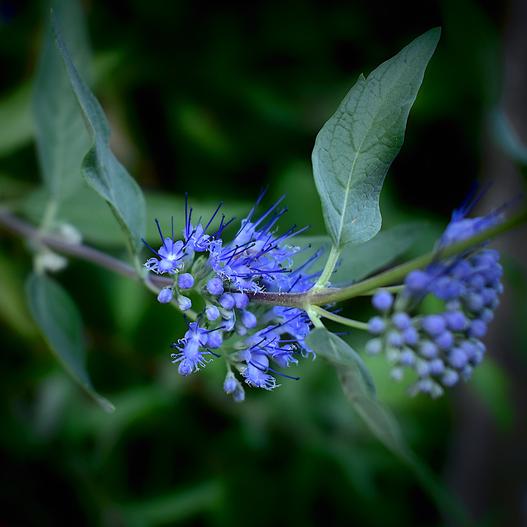Bluebeard
(Caryopteris incana)
Bluebeard (Caryopteris incana)
/
/

delirium florens
CC BY 2.0
Image By:
delirium florens
Recorded By:
Copyright:
CC BY 2.0
Copyright Notice:
Photo by: delirium florens | License Type: CC BY 2.0 | License URL: https://creativecommons.org/licenses/by/2.0/ | Uploader: delirium florens | Publisher: Flickr





















Estimated Native Range
Summary
Caryopteris incana, commonly known as Bluebeard or Blue Spiraea, is a deciduous shrub native to open woodlands and sunny, rocky sites in East Asia, including China, Korea, and Japan. It typically grows to a height and width of 2-3 feet (0.6-0.9 meters), making it a compact addition to the garden. The plant is characterized by its aromatic, gray-green foliage and clusters of small, tubular blue to violet flowers that bloom from late summer into fall, attracting pollinators such as bees and butterflies.
Blue Spiraea is valued for its late-season blooms, which provide color when many other plants have finished flowering. It is often used in borders, as a low hedge, or in butterfly gardens. This shrub is drought-tolerant once established and prefers well-drained soil. It thrives in full sun but can tolerate light shade. To encourage bushier growth and more flowers, gardeners can prune the plant back in early spring. While generally low-maintenance, Caryopteris incana can be susceptible to root rot in poorly drained soils and may be affected by whiteflies or spider mites.CC BY-SA 4.0
Blue Spiraea is valued for its late-season blooms, which provide color when many other plants have finished flowering. It is often used in borders, as a low hedge, or in butterfly gardens. This shrub is drought-tolerant once established and prefers well-drained soil. It thrives in full sun but can tolerate light shade. To encourage bushier growth and more flowers, gardeners can prune the plant back in early spring. While generally low-maintenance, Caryopteris incana can be susceptible to root rot in poorly drained soils and may be affected by whiteflies or spider mites.CC BY-SA 4.0
Plant Description
- Plant Type: Shrub
- Height: 2-2.5 feet
- Width: 2-3 feet
- Growth Rate: Moderate
- Flower Color: Blue, Purple
- Flowering Season: Fall
- Leaf Retention: Deciduous
Growth Requirements
- Sun: Full Sun
- Water: Medium
- Drainage: Fast
Common Uses
Bank Stabilization, Bee Garden, Border Plant, Butterfly Garden, Deer Resistant, Drought Tolerant, Fragrant, Low Maintenance, Showy Flowers, Street Planting
Natural Habitat
Open woodlands and sunny, rocky sites in East Asia
Other Names
Common Names: Common Bluebeard, Bluebeard, 灰葉蕕, 층꽃나무, 층꽃풀
Scientific Names: , Caryopteris incana, Nepeta incana, Caryopteris mastacanthuo,
GBIF Accepted Name: Caryopteris incana (Thunb. ex Houtt.) Miq.